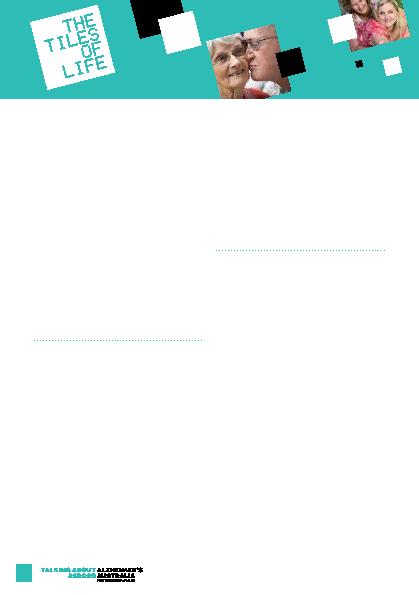
an annual comprehensive assessment
of neuropsychological function, medical
health, socialisation, and personal wellbeing.
Premorbid estimates of past cognitive,
education, occupational, and physical function
will be used to account for the mediating
influence of prior life experience on outcomes.
Potential contributing genetic factors will also
be explored. To date a total of 450 participants
have commenced in the THBP. Preliminary
exploratory factor analysis has been used to
identify a composite measure of premorbid
cognitive reserve. Initial results are promising;
indicating that current cognitive reserve
increased in a group of adults undertaking
university education in late life, with the
magnitude of this increase appearing to be
greater than observed in an age matched
control group. The THBP is expected to run for
10-20 years duration.
Alzheimer's Australia WA
Alzheimer's WA, in Albany, in the Great
Southern region of WA that provides respite
for people with dementia and their carers.
The Eden Principles are used in all activities
and relationships at Hawthorn House. These
principles are a framework for person-centred
care, and seek to address the three plagues of
loneliness, helplessness, and boredom. The
research project was established to investigate
the quality of life (QOL) of the people with
dementia associated with the centre, their
carers, staff and volunteers, and also to
these people. Qualitative and quantitative
methods were employed. Quantitative
methods included the QOL-AD and GHQ-12
surveys. A survey from the Eden website
was modified for Australian respite conditions.
Dementia Care Mapping was used to give
additional, independent data on client well/
ill-being. Qualitative data was obtained by
applying thematic analysis to transcribed, semi-
structured interviews. This article gives an
overview of the key findings from this project.
Alzheimer's Australia NSW education program
`Engaging in Meaningful Activities in the
Home'.
carers asking "what can I do with the person
I am caring for". The first of two pilot
workshops was delivered in October 2012. The
pilot was evaluated and changes were made.
The second pilot workshop was delivered in
November 2012 and positive feedback was
received.
and health care professionals to engage in
activities that are meaningful for the person
living with dementia and to create a supportive
environment. The program incorporates
Montessori principals, such as, Support me,
Support my environment, and just watch what
I can do. (Elliot, G. 2011: Montessori Methods
for Dementia).